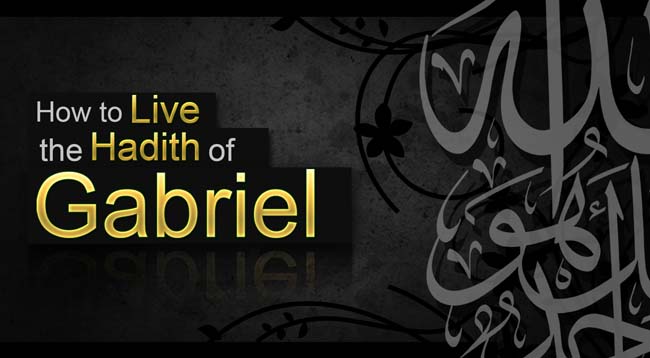How to Live the Hadith of Gabriel Part 2

The virtue of seeking knowledge (‘Ilm)
In the name of God we begin as we delve deeper into the hadith of Gabriel in Imam Nawawi’s 40 hadith. Gabriel (God’s peace be upon him) comes to the Prophet (peace and blessings be upon him) and without hesitation or any formalities begins to question the Prophet on the religion of Islam. This action by the angel Gabriel shows us the heightened state of seeking knowledge; it shows us that when the opportunity presents itself we should take it. The angel Gabriel’s lesson to the Companions and by extension ourselves was to take knowledge when you can. God tells us in the Quran, “He gives wisdom to whom He wills, and whoever has been given wisdom has certainly been given much good. And none will remember except those of understanding” (Qur’an 2:269).
Abu Hurairah (may God be pleased with him) reported that the Messenger of God (Peace and blessings be upon him) said, "God makes the way to Jannah easy for him who treads the path in search of knowledge.” [1]
Both the hadith and the verse reflect on the importance of knowledge. In the hadith, we are taught that by seeking knowledge, God ultimately makes our path to paradise easier. Yet one has to understand that there is a caveat, knowledge does not bestow itself onto someone without work and dedication. It is ultimately through that hard work and dedication that God will enter one into paradise if the intention of the individual is also sound.
The verse from the Quran highlights that while the intention and effort are needed, ultimately it is in the hands of God to decide whom He will bestow knowledge upon. Some people of faith have beautiful intentions to succeed in a certain field such as studying religion but God has a different plan for them, one should always keep in mind that ultimately it is God that knows best.
Gabriel asked the Prophet Muhammad (peace and blessings be upon him) to explain to him about Islam. The response of the Prophet was succinct, as he was known for his beauty and eloquence of speech. It is also important to note that he was also known for his efficiency in speech. He spoke in a way that allowed the listener to be able to hear, internalize and remember the words he spoke.
"Islam is that you should testify that there is no deity worthy of worship except God and that Muhammad is His Messenger, that you should perform salah (ritual prayer), pay the zakah, fast during Ramadan, and perform Hajj (pilgrimage) to the House (the Ka`bah at Makkah), if you can find a way to it (or find the means for making the journey to it).”
These five pillars, already known to us make up the foundation of our sacred way of life. In another hadith the Prophet tells us that Islam was “built upon five”, and goes on to list the pillars of the religion. This narration gives us a strong visual representation of what the pillars mean in the lives of Muslims. Without the pillars, there is nothing for one’s religion to reinforce it. Upon receiving this answer from the Prophet Muhammad, Gabriel replies that he is correct. The Companions, whom are already confused as to this stranger and his appearance are now even more shocked to hear him give validation to the Prophet. In their eyes, there is no one greater or more knowledgeable of the faith than the Prophet of God. Again, we are taught yet another exceedingly important lesson in this scene, there is always someone more knowledgeable than you. While God gave us all the faculty of learning (some more than others) there is someone that may be using that ability far more than you, or specializing in something you have no specialty in. Our job is to never let arrogance overtake us but instead to remain humble and remember our place with God.
At times, we feel that the 5 pillars of Islam are sufficient but we forget that our hearts also need rectification in order to be at peace and in a state of complete submission to God. As such, Gabriel goes on to ask the Prophet about the true meaning of faith, to which he answers, “It is that you believe in God and His angels and His Books and His Messengers and in the Last Day, and in fate (qadar), both in its good and in its evil aspects.”
This is the stance of Islam. Much of this is straightforward, the Muslim believes God is One and without partners. That His angels are a creation that do not disobey Him; that books such as the Torah and Gospels were sent to various groups and tribes to serve as a means of guidance; that God chose men to guide these people and to be the embodiment of the books that He sent and that all of these men warned of a day when all would stand before God. Fate oftentimes is the area most difficult to grasp in today’s modern world in which we all refuse to be puppets in a game, what we have to understand is that in God’s world we are not strung along like puppets. It is in God’s infinite knowledge that He knows what choices we will make and how we will ultimately make them. All has been written down from the beginning of time when God created the pen and told it to write all that will take place until the end of time. Your every decision is not made for you, rather they are known to the Creator. We are a creation with the ability to choose as we wish and the best of us bring our actions in line with the sacred sanctions that God sent down to us. In this, we as Muslims believe and with it our belief in God becomes sound.
Gabriel then asks him about a special word, Ihsan, “Inform me about Ihsan.”
To this, the Prophet Muhammad replies, “It is that you should serve God as though you could see Him, for though you cannot see Him yet He sees you.”
This answer again highlights the eloquence of the Prophet. He succinctly answers this question in a way that his followers are able to digest and fully understand. In a way that we today as his followers are able to fully comprehend. The way we should worship is as though we could see the King of Kings, if we were able to see Him before our prayer how would we worship? As though we are distracted? Confused? Would we begin if we were unclean? Wouldn’t we first ensure we would be left undisturbed? The answers to all of the questions is a clear one, and should be clear to all of us. We would worship with the utmost respect and adoration for the One we are standing in front of, all of our acts would be done with the greatest level of sincerity. This is what Ihsan is about.
Lastly, Gabriel asks about the time of the day of Judgment and its signs. To this question, the Prophet replies that he nor the angel Gabriel is aware of the timing of the day of Judgment. This is yet another lesson the Muslim can learn in humility, the Prophet had no problem being clear that this was an aspect of knowledge that he did not have. At various points in a person’s life they may be asked about information that they don’t have, yet out of embarrassment and arrogance they still attempt to answer. No person wants to feel lower than others and as such they attempt to answer regardless of their level of expertise, this is not the Prophetic way. In fact, it is antithetical to what the Prophet has shown us. He humbly admitted that he does not have that information and highlighted what he did know.
In short, this hadith is replete with beneficial points for the believer. Areas in which we are able to derive benefit for every area in our lives. The goal of the believer is to continually read these words of our noble Prophet and to act upon them when applicable. By doing so, we will bring our manners in line with the exalted manners of the beloved Prophet of God. Manners and a way of life that bring about the pleasure of God and bring honor and dignity to the Muslim community.
ــــــــــــــــــــــــــــــــــــــــــــــــــــــــــــــــــــــــــــــــــــــــــــــــــــ
[1] Riyad As Saliheen Book 13, Hadith 1381
 Arabic
Arabic French
French Deutsch
Deutsch Urdu
Urdu Pashto
Pashto Swahili
Swahili Hausa
Hausa

